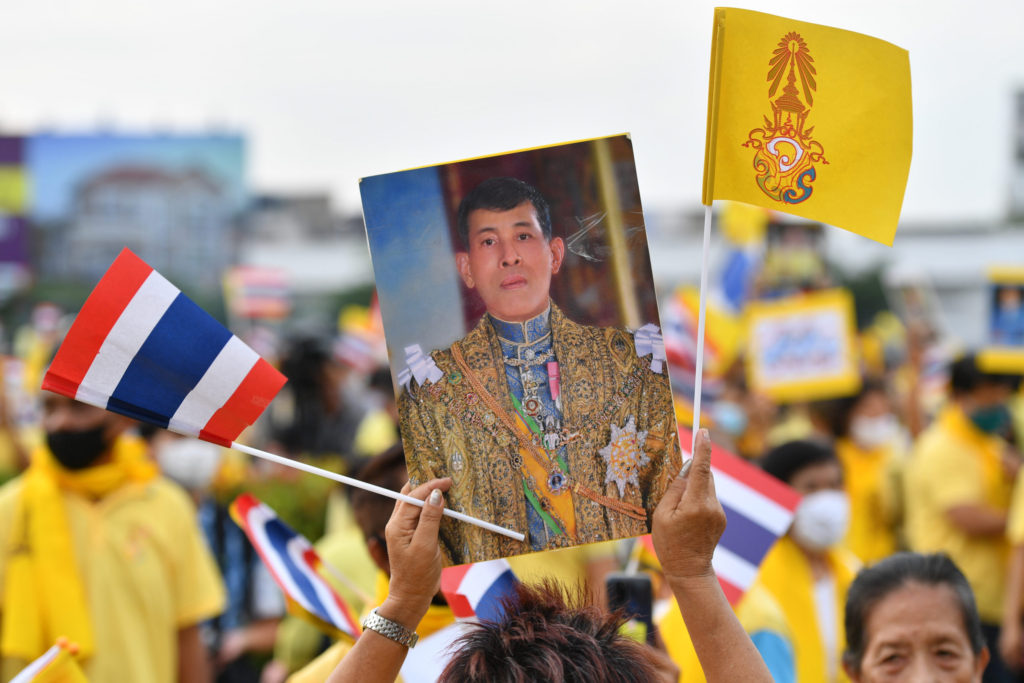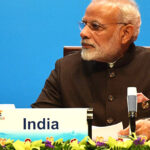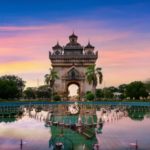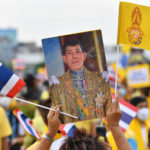
The death of King Bhumibol Adulyadej on October 13, 2016 marked a substantive shift in public sentiments toward the Thai monarchy. In mourning and in unity, hundreds of thousands of Thais gathered a week later at Sanam Luang Park, to sing the royal anthem, Sansoen Phrai Barami, in close proximity to the Grand Palace, where royal and religious rites had been taking place.
October of 2016 was also an uncertain time to be in Thailand, as Thais mourned against the backdrop of vigilantism and hyper-royalism. Outside Phuket on October 14, 2016, a mob descended on a small shophouse, demanding the arrest of a young man they claimed had disrespected the monarchy on social media. Police arrested the man, only to release him later due to a lack of evidence.
A similar event occurred in Phang Nga province. The Thai Justice Minister, Paiboon Koomchaya, fanned the flames of vigilantism, suggesting that Thai people should “socially sanction” those who defame the Thai monarchy. Other incidents followed, including an elderly woman who suffered from mental illness who was hounded off a public bus after other passengers accused her of disrespecting the monarchy. One passenger assaulted the woman before authorities arrived. The line between legitimate mourning and the legitimisation of violence was blurred by hyper-royalism, with an endorsement by the state.

Fast forward four years and Thailand finds itself in a peculiar place, with its military-backed government and monarchy under the reign of King Maha Vajiralongkorn in a downward spiral. Thai Prime Minister Prayut Chan-o-cha, although he received a royal endorsement for his 2014 coup d’état, suffers from a crisis of public confidence, partially for his handling of the Thai economy, Covid-19, and the regime’s draconian measures to curtail criticism and dismantling of the Future Forward Party after the March 2019 elections and its charismatic leader Thanathorn Juangroongruangkit.
King Vajiralongkorn later discovered that legitimacy is not a currency that can be transferred from monarch to monarch. In a leadership style that significantly departs from that of his father, he has moved to consolidate political power, assuming control over billions of dollars of assets from the Crown Property Bureau and the command of the 1st and 11th Infantry Regiments, based in Bangkok. He has directly interfered into the affairs of the military, endorsing the selection of Generals Apirat Kongsompong and current Royal Thai Army chief Narongpan Jittkaewtae, as well as the establishment of a Royal Command Guard.
His image, not crafted in the role of the dhammaraja, or based on the notion that the monarch should be working for the betterment of Thai society and fully engaged in promoting their general welfare, stands in contrast and suffers as a result. Part of it is related to his more direct leadership and growing public criticism over his prolonged absences in Germany.
In the space between October 2016 and October 2020, the Thai monarchy has failed to build a public image – or seek an existence in the ample shadow of Rama 9. Since his ascension to the throne, Vajiralongkorn has instead portrayed himself more of an absolute monarch, ruling not by earning legitimacy or inspiring loyalty among his Thai subjects, but through the instillment of fear and anxiety.
His consolidation of political power has been swift. Before Thailand’s military junta could pass its contentious referendum over its 20th Constitution, the King returned the draft back to the National Legislative Assembly, requesting that certain articles relating to his own powers and the powers of the Privy Council be changed to allow him to travel overseas whenever he wishes without the need for a regent and reestablished the power to impose vetoes and the right to dissolve the Legislative Assembly.
Fear and anxiety were used as weapons against the public too, as the military-backed government punished Jatupat “Phai” Boonpattararaksa for sharing a BBC article on his Facebook page about the biography of Vajiralongkorn. Since the May 2014 coup, more than 90 people have been prosecuted under Thailand’s lèse majesté law, while 43 have been sentenced, substantially higher than in previous decades under Bhumibol.
Yet, the recent student-led political protests and calls for monarchical reform have upended that fear mongering. Thai citizens have pointed their three-fingered gestures directly at Vajiralongkorn and his motorcade. Thousands of people have taken to the streets on many consecutive nights, recently in front of the German Embassy, first submitting a letter requesting the German government investigate whether the King had conducted royal business from German soil.
The monarchy has failed to embrace reform and prepare for the eventuality that reform would one day come. The countless cycles of crisis followed by coups d’état have been the norm since the era of Field Marshal Sarit Thanarat. Extra constitutional interventions have been normalised and disruptions in democratic processes have for too long been tolerated.
Even during the reign of Bhumibol, the monarchy could have realised that the investment of nearly all of the institution’s moral and public legitimacy into a single figure was a short-term bet – and that legitimacy could not realistically be sustained without substantive changes. Instead, the monarchy, and its willing partner, the military have deemed anyone set on democratic reform as subversive to it and to the Thai state. David Streckfuss, in a 2014 commentary on a similar subject, once noted that the more royalists draw on the monarchy to legitimise attempts to thwart democracy and to use the lèse majesté law against those who are considered enemies, the monarchy would fall further into the abyss. His analysis proved to be correct.
The Thai monarchy has not learned from history. It continues to foment opposition to pro-democratic elements in Thai society. Vajiralongkorn recently praised a royalist supporter who had engaged with protesters and greeted Buddha Issara, a controversial former monk involved with the PDRC in 2014. Despite the repeated efforts by the military-monarchy alliance to demonise, marginalise, silence (or worse) dissent, the pro-democracy movement persists – and in the absence of moral and popular legitimacy, it has grown.
Social taboos and archaic traditions are no longer effective. A reasonable alternative is to embrace reform and work with democracy rather ensuring the survival of the monarchy in its current form. Monarchies in Europe have survived the transition from absolute to constitutional varieties intact and have become legitimising forces for democratic values. Belgium has had multiple struggles. When King Albert II abdicated the throne in 2013 amid royal scandals, his son and now-King Philippe was rather unpopular, and described as “shy, uncomfortable and sometimes heavy-handed.” Slowly, however, King Philippe has begun to emerge as a stabilising influence in Belgium’s contentious politics.
In the wake of the death of George Floyd at the hands of the Minneapolis police in the United States, King Philippe addressed the Belgian monarchy’s legacy of colonialism and issued a statement on the 60th anniversary of the Congo’s independence, expressing “profound regret” for the mistakes of the past, including “acts of violence and cruelty” committed under the reign of King Leopold II.
Thailand should take a page from the Belgians and begin the process of reconciling decades of structural and cultural violence.
Despite all of the criticism and public discontentment over the monarchy’s destructive role in Thai politics, hope remains. Princess Maha Chakri Sirindhorn, Bhumibol’s second daughter, remains extremely popular among Thai people. Elite figures in Thai society can shepherd the Thai monarchy into a new era, or help reconcile its shortcomings with a fractured public.
Rather than retaliate or mobilise conservative royalist elements, which in the past have legitimised violence in its defence, Thai royals and ruling elites must bridge social and political divides or they will soon find themselves lacking a dignified place in Thai civil society or a constructive role in the political affairs of a Thai republic.






